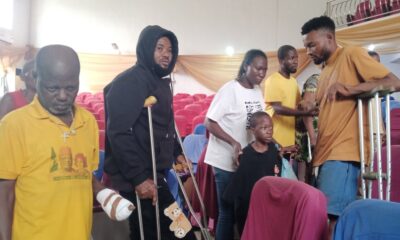News
SSDO decries alarming exploitative child domestic work in S/East region
Chinelo Kodilichukwu Enugu
The South Saharan Social Development Organization (SSDO) , a non-governmental organization, has decried the high level of exploitative Child Domestic Work (CDW) and other child unhealthy conditions in the South-East region.
The Executive Director of SSDO, Stanley Ilechukwu, said this Thursday during a One-Day High Level Meeting on Exploitative Child Domestic Work (CDW) in South-East Nigeria held in Enugu.
The meeting, which was organized by SSDO in collaboration with the Enugu State Ministry of Children, Gender Affairs and Social Development, had high level participants drawn from the executives and legislative dignitaries from Anambra, Ebonyi and Enugu States.
Ilechukwu called for urgent attention meant to ensure proposed actionable solutions and provide a structural framework for inter-state collaboration on exploitative child domestic work in particular and child protection in general.
He lamented that the South-East had the highest percentage of Child labour in the country with a 49.9 per cent rate.
The SSDO boss called on stakeholders to work towards developing and promoting effective legislation and policies that target exploitative CDW while respecting the cultural practices integral to the communities.
He noted that the mission of SSDO, “is to foster a world where every person has equal access to opportunities through education and good governance initiatives, with a particular focus on women, youth and children.”
“Child domestic work has deep cultural roots in the South-East. Historically, CDW has been viewed as a means of providing indigent children with opportunities for formal or vocational education in exchange for their labor.
“However, the reality is often starkly different. Many of these children, predominantly young girls, suffer physical and sexual abuse, and their agreed upon educational opportunities are frequently denied.
“These violations remain largely unreported due to power imbalances and fear of reprisal,” he said.
Ilechukwu said that the meeting remained a crucial step in addressing this issue as well as discuss actionable solutions and develop a structured framework for interstate collaboration on exploitative child domestic work and broader child protection measures.
Earlier, the Enugu State Commissioner for Child, Gender Affair and Social Development, Mrs Ngozi Enih, disclosed that combating exploitative CDW and ensuring comprehensive child protection required the concerted efforts of all states in South-East.
Enih said that the state government was committed to fostering a safe and nurturing environment for every child.
She said that the state had made significant strides toward eliminating exploitative CDW through legislative reforms, public awareness campaigns and collaborative efforts with organizations like the SSDO.
“By working together, sharing resources, and harmonizing our policies; we can create a safer and more supportive environment for all our children. Furthermore, the need for interstate collaboration cannot be overstated,” he said.
Speaking, Mrs Ifeyinwa Obinabo, Commissioner of Women and Children Affair, Anambra, cautioned parents to stop giving out their children with mental or emotional imbalance notwithstanding the financial benefit to such act.
Obinabo said that Dr Nonye Soludo, Wife of the Governor of Anambra State, had put child protection in the front burner in the state and stood out for any case of child injustice, dehumanization and sexual exploitation by anyone in the state.
Corroborating, the Commissioner for Women and Children Affairs, Ebonyi State, Mrs Felicia Nwankpuma, said that the state government had done a community-to-community sensitization against or preecautions to take before sending children to serve as child labour.
Nwankpuma noted that with the wide sensitization, there is a current changing trend of parents giving out their children to serve as domestic help anywhere in the country.
The participants included representatives of the ministry of justice and police within the three states, namely: Anambra, Ebonyi and Enugu States.


















